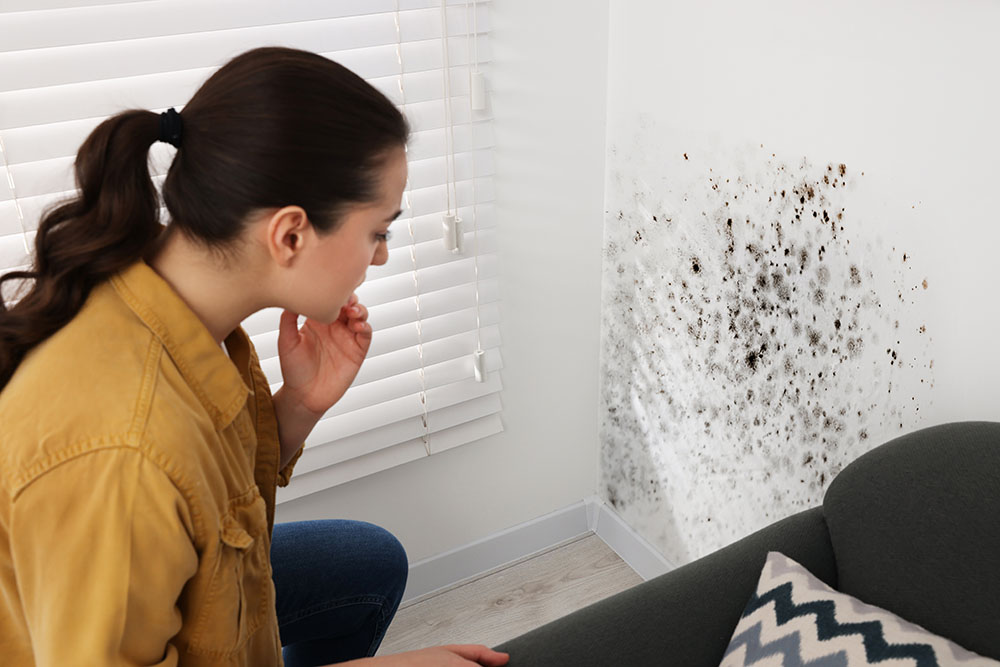Can A Tenant Be Responsible For Mould?

CONTENTS
- What are tenants responsible for?
- What are landlords responsible for?
- Is it dangerous to live in a home with mould?
- How to prevent mould
- How to report mould to your landlord and council
- What happens if your landlord ignores mould?
- Frequently asked questions
- Get in touch
When mould infiltrates your living space, it is more than just an unsightly nuisance; it can signal deeper issues in a rental property and even pose health risks. Tackling tenant responsibility is integral to understanding the roles tenants and landlords play in preventing, reporting, and addressing mould.
At ICE Cleaning, we are the leading provider of excellent mould remediation services in the UK. Our technicians are Dewpoint-accredited and have extensive experience in identifying and eliminating mould, preventing its return in the future.
Read on to learn more about the necessary tools and insights about mould, blending legal advice with practical strategies to ensure your living space remains dry and conducive to health, a vital resource for every renter.
What are tenants responsible for?
Tenant responsibility for mould often revolves around regular maintenance and lifestyle practices that prevent mould growth. With over 58% of private rental homes suffering from damp, it is clear that this issue is more widespread than most realise.
This means actions like opening windows regularly or using extractor fans can significantly mitigate risks. Practices such as avoiding drying clothes indoors, requesting extractor fans, and keeping furniture away from external walls help prevent mould growth.
When these preventative measures fail, you must contact your landlord to address more severe underlying causes like rising damp or leaking pipes. These fall under landlord responsibilities according to the Landlord and Tenant Act 1985.
What are landlords responsible for?
With rental properties, landlords are responsible for ensuring their premises meet strict health and safety standards. This includes the crucial task of preventing and addressing mould issues.
Understanding these obligations is essential for tenants and landlords to maintain a healthy living environment.
Landlords must take proactive steps to avoid the conditions that encourage mould growth. This involves ensuring proper ventilation throughout the property, fixing leaks promptly, and maintaining adequate heating levels.
Regular inspections can also help identify potential problems before they escalate into serious mould infestations.
Renting out a property comes with an obligation towards tenant safety, including environmental concerns, like air quality affected by unwanted elements such as black mould.
Despite preventative measures, mould might find a way to grow within rented properties anyway. In such cases, it is up to landlords to arrange for professional remediation immediately. The goal is to ensure mould is identified and removed at its source, whether due to damp or structural defects.
UK government guidelines suggest that landlord responsibilities include confirming their properties are free from serious health hazards like damp and mould, which can affect tenants' health severely if left unaddressed.
Is it dangerous to live in a home with mould?
Mould and damp conditions in homes are more than unsightly; they pose significant health risks, particularly to vulnerable people. Inhaling spores from mould can lead to breathing issues, allergic responses, and asthma attacks.
Long-term residence in a damp house can lead to chronic health issues. Mould produces tiny spores that are light enough to linger in the air and enter the respiratory systems of those living in it. Living in such environments increases the chances of health issues.
Additionally, those with weakened immune systems or pre-existing illnesses may find their conditions worsen due to these spores.
How to prevent mould
There are combined things that a tenant and landlord can do to ensure a safe and clean home to prevent mould in a property. You can make your property safer by making these small changes to your behaviour or asking your landlord to assist.
How tenants can prevent mould
- Use exhaust fans in bathrooms and kitchens, and open windows to allow fresh air circulation
- Use a hygrometer to measure indoor humidity levels regularly
- Use mould-resistant cleaning products to prevent the growth of mildew and mould
- Avoid overwatering indoor plants, as excess moisture can contribute to indoor humidity levels
- Wipe down wet surfaces or condensation
- Clean your home regularly by hoovering, mopping, and dusting
- Dry clothes outdoors or on a heated clothes horse
- Keep bathroom and kitchen doors closed to isolate steam and moisture
How landlords can prevent mould
- Keep indoor humidity levels below 60% with a dehumidifier
- Address any leaks in plumbing, roofs, or windows immediately to prevent moisture buildup
- Use mould-resistant paints, drywall, and insulation in moisture-prone areas
- Ensure proper insulation in walls, floors, and ceilings
- Ensure your property's exterior slopes down from the foundation to direct rainwater away from the building.
- Check for gaps or cracks around windows and doors and seal them properly
- Have the gutters and downspouts cleaned regularly to prevent clogs
- Install extraction fans in bathrooms and kitchens for the tenants
- Ensure the air conditioning units are well-maintained
- Address condensation on windows, walls, or pipes promptly
- Conduct regular inspections of your property for signs of water damage, leaks, or mould growth
How to report mould to your landlord and council
When mould arises due to factors beyond simple maintenance, you must act swiftly. To start with, document every instance of mould. Photos and detailed notes on where the mould appears, its extent, and how quickly it seems to spread will support your case effectively.
Gathering this proof is crucial for discussions with your landlord and the council. Communication should always be in writing — emails or letters provide a traceable record of your efforts to address the issue.
Mention any health risks associated with living in damp conditions within your correspondence; this highlights the urgency of resolving the issue promptly.
It is worth noting that while mandatory response times from private landlords are not legally binding, government guidance suggests immediate action.
What happens if your landlord ignores mould?
If your landlord ignores your communication or continues to leave the mould, you must contact your local council. In cases where the mould is severe and there is a delay in action from the council, you may need to seek legal advice from a solicitor.
If you are in this situation, start by documenting all communication with your landlord regarding the mould issue. Photos of affected areas, emails or letters sent requesting repair work – this evidence will be invaluable if legal action is taken.
Consulting with a solicitor specialising in tenant rights could assist in your next steps and advise on proceeding directly to small claims court if other resolution attempts fail.
Frequently asked questions
What are the tenant's rights to damp and mould compensation?
Tenants can claim compensation if mould damages health or belongings, but they must prove landlord negligence first.
Can a landlord be fined for mould?
Yes, landlords can face fines if they ignore mould complaints that pose health risks, under housing safety regulations.
What is the new law on damp and mould?
The Homes (Fitness for Human Habitation) Act 2018 makes landlords fix severe health hazards like damp and mould promptly.
Can I withhold rent due to damp?
If you choose to stop paying rent, your landlord may evict you and you'll get into rent arrears.
Get in touch
For mould cleaning services, our team at ICE Cleaning can help. Our teams are stationed nationwide, prepared to help you with any damp-related issues or mould infestations that have taken over your home.
To learn more about our mould removal services, contact our team today at 0208 066 0360 or enquiries@icecleaning.co.uk. We can be on-site within a few hours of your first call, providing guidance 24/7, all year round, no matter where you are.

Speak with me today,
I’m here to help
By asking you a few questions either via phone or email I can immediately provide a realistic estimation of the cost.

Why choose us?
- Cater to a wide variety of cleaning situations
- Nationwide coverage, available 24/7
- Cater to commercial and domestic clients
- Free survey provided prior to quotation
- Emergency response team
- Offer a bespoke service designed to suit all your needs
- All technicians hold professional health and safety qualifications, including BICSc, IOSH, Dewpoint Professional & Safe Contractor
We’re fully accredited
We place best practise, professional expertise and health and safety at the core of our business. We’re fully compliant with all legal obligations. You can view a list of our accreditations below, or visit our Health & Safety page for more information.











-RGB-small.1707319151.jpg)




















